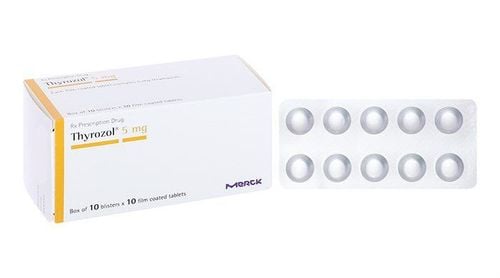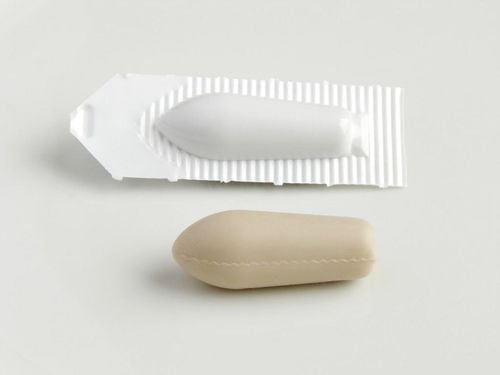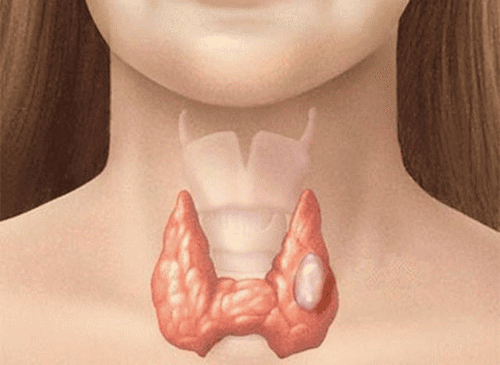1. What is the pharmacological effect of Thyrozol 5mg?
What is Thyrozol? Thyrozol, also known as thiamazole, belongs to the class of antithyroid medications. What conditions does Thyrozol 5mg treat? Thyrozol is effective in the treatment of hyperthyroidism, particularly in cases of small goiter absent goiter, as well as in patients preparing for surgery, prior to radioactive iodine treatment, or intermittently following radioactive iodine therapy.
Additionally, Thyrozol is also used for the prevention of latent hyperthyroidism, thyroid adenoma and in patients with a history of hyperthyroidism who are to be exposed to iodine.
2. How to use Glotadol
Thyrozol 5mg is formulated as film-coated tablets with a dosage of 5mg. Please use Thyrozol according to the instructions provided on the product packaging. Typically, the initial dose is 10-14 mg per day, depending on the severity of the condition and the amount of iodine used. The maintenance dose is approximately 5-20 mg per day, possibly in combination with levothyroxine, or 2.5-10 mg per day. Patients with iodine-induced hyperthyroidism may require a higher dose.
- For a conservative treatment duration of 6 months to 2 years, short-term treatment is recommended if there is a large goiter causing tracheal obstruction, ideally in combination with levothyroxine.
- For the preoperative period: Typically, this lasts 3-4 weeks or longer. Treatment may be discontinued and a high iodine dose can be administered for 10 days to compensate for the risk of increased fragility and hemorrhage of thyroid tissue caused by thiamazole before surgery (also known as plummer therapy with iodine). At this point, the surgeon will proceed with the operation once euthyroid status is achieved.
- For the period before radioactive iodine treatment: Thionamide derivatives may reduce the sensitivity of thyroid tissue to radiation.
For the intermission period after radioactive iodine treatment: This lasts approximately 4-6 months depending on the patient's condition and the anticipated time until the radioactive iodine therapy begins to take effect. - For prophylactic treatment doses: The dosage is approximately 10-20mg or 1 gram of perchlorate over a period of 10 days. Patients with liver failure or renal failure, as well as the elderly, should maintain the lowest possible dose and be closely monitored.
In the treatment of hyperthyroidism with a high initial dose, it is necessary to divide the daily dose into smaller amounts and take them at regular intervals throughout the day. You should use Thyrozol exactly as directed by your doctor; do not exceed the prescribed dose, take less, or use it for a longer duration than indicated. Patients may take Thyrozol with or without food, or as directed by their specialists. Use Thyrozol regularly to gain the most benefit, and discontinue use if any new unusual symptoms appear or if the condition does not improve after 7 days. Do not misuse the medication for an extended period. This will not improve the patient's condition and may increase the risk of experiencing unwanted side effects.

3. Side effects when using Thyrozol 5mg
Some side effects that may occur when using Thyrozol include:
- Skin allergic reactions such as itching, redness, urticaria, etc,…
- Gradual joint pain, which may even occur after several months of treatment, is a common side effect.
- Agranulocytosis
- Taste disturbances
- Drug-induced fever
- Thrombocytopenia
- Pancytopenia
- Lymphadenopathy
- Autoimmune insulin syndrome
- Neuropathy
- Polyneuropathy
- Acute salivary gland swelling
- Cholestatic jaundice
- Toxic hepatitis
- Severe forms of skin allergic reactions include dermatitis, drug-induced lupus erythematosus, and alopecia.
Before prescribing the medication, the doctor always considers the benefits and effectiveness that Thyrozol provides against the risk of side effects. However, in some cases, side effects may still occur when using Thyrozol. Therefore, if any unusual symptoms appear, especially in case of a severe allergic reaction with accompanying signs such as severe dizziness, difficulty breathing, rash, swelling or itching of the face, throat or tongue, the patient should immediately inform the doctor or nurse to receive immediate medical intervention.
4. Some precautions when using Thyrozol
Some precautions when using Thyrozol include:
- Inform your doctor about any history of allergies to Thyrozol or any other allergies. Thyrozol may contain inactive ingredients that can cause allergic reactions or other serious problems.
- Inform your doctor about all medications you are currently taking, including prescribed medications, non-prescription drugs, herbal products, and dietary supplements.
- Thyrozol should only be used for a short duration under strict medical monitoring if the patient has a large goiter with tracheal obstruction, due to the risk of goiter growth.
- Do not use the medication if you have a history of mild allergic reactions.
- Discontinue use if agranulocytosis is confirmed or if there is evidence of bone marrow toxicity.
- Do not exceed the recommended dose, as this may lead to clinical or latent hyperthyroidism and goiter growth.
- Late hypothyroidism may occur after treatment if other surgical methods are not considered.
- Thyrozol should not be used if the patient has hereditary galactose intolerance, poor glucose-galactose absorption, or lactase deficiency.
- For breastfeeding women, use the lowest effective dose and do not use additional thyroid hormones.
- For pregnant women, there is not enough research available to determine the risks of using the medication during pregnancy. Always consult your doctor before using Thyrozol to consider the benefits and the risks.
If you forget to take a dose of Thyrozol, take it as soon as possible. However, if the time you remember is close to the time of your next dose, skip the missed dose and continue taking the medication as originally scheduled. Do not take more than the prescribed amount. An overdose of Thyrozol or swallowing too much can lead to serious symptoms such as nausea, vomiting, abdominal pain, difficulty breathing, fainting, etc,…

5. Drug interactions
Drug interactions may reduce the effectiveness of Thyrozol or increase the risk of side effects. Inform your doctor about all other medications you are taking, including non-prescription drugs, vitamins, prescription medications and herbal products. Do not initiate, discontinue or alter the dosage of any medication without your doctor's approval.
Additionally, iodine deficiency may enhance the thyroid response to Thyrozol, while excess iodine may diminish this response. The metabolism and elimination of other medications may be accelerated in hyperthyroid patients. Thyrozol may normalize the effect of anticoagulants in patients with hyperthyroidism.
6. How to store Thyrozole
Store Thyrozol at room temperature, protected from light and moisture. It should not be kept in humid environments or in the freezer, and must be kept away from heat sources and open flames. Each medication has specific storage requirements, therefore it is essential to read the storage instructions for Thyrozol on the packaging or consult a pharmacist. Keep Thyrozol out of reach of children and pets. When the medication has expired or is no longer usable, dispose of it properly according to established protocols. Do not dispose of Thyrozol in the environment, such as through drains or toilets, unless specifically instructed. Consult with waste management authorities or a pharmacist for safe disposal methods to help protect the environment.
In summary, Thyrozol, also known as thiamazole, belongs to the class of antithyroid medications. It is effective in the treatment of hyperthyroidism, particularly in cases without goiter or with small goiters,as well as in those preparing for surgical intervention, prior to radioactive iodine therapy, or as a transitional treatment following radioactive iodine therapy. However, Thyrozol may cause certain side effects and drug interactions, so it is important to inform your doctors about all medications you are taking to minimize the risk of side effects and enhance the effectiveness of the treatment.
To arrange an appointment, please call HOTLINE or make your reservation directly HERE. You may also download the MyVinmec app to schedule appointments faster and manage your reservations more conveniently.













